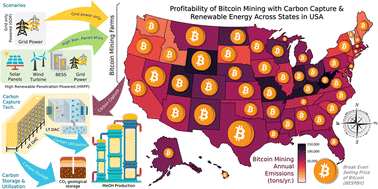Mining bitcoins with carbon capture and renewable energy for carbon neutrality across states in the USA†
Abstract
Bitcoin mining requires a significant amount of electricity to validate blocks, increasing greenhouse gas emissions. Therefore, major countries such as China, Iran, Russia, Turkey, and Vietnam are banning bitcoin mining to avoid grid imbalances, power failures, and environmental issues. To alleviate these concerns, we conducted a techno-economic analysis of 50 states and a federal district (Washington D.C.) in the US in terms of the feasibility of bitcoin mining using carbon capture and renewable energy. We analyzed the profitability of bitcoin mining in the US states using grid and renewable power resources along with high-temperature and low temperature direct air capture technologies for CO2 capture and storage and methanol as a product. From both economic and environmental perspectives, we evaluated the net CO2 emission for each state to determine its competitive advantages. Overall, this work offers a holistic overview of where bitcoin mining can be economically viable across US states. Additionally, it provides insights into achieving environmentally friendly cryptocurrency mining regulations based on carbon capture and renewable energy and gauging the costs of bitcoin mining powered by the grid and high renewable penetration across the US states while pursuing carbon neutrality.



 Please wait while we load your content...
Please wait while we load your content...